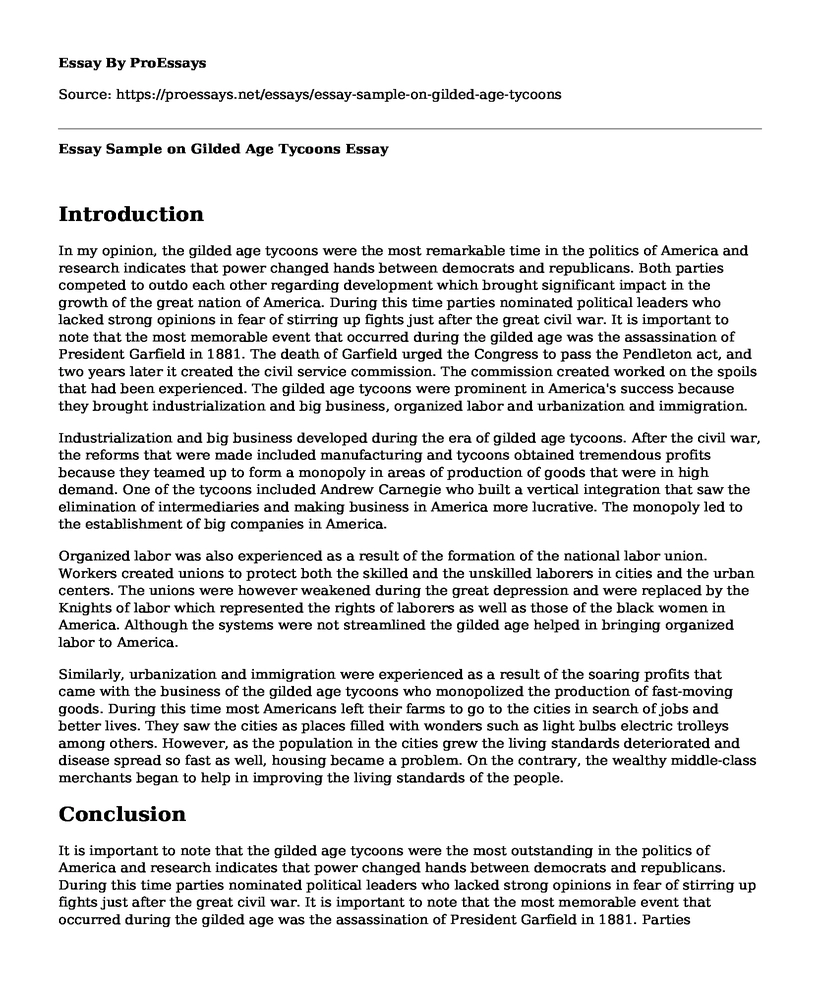Introduction
In my opinion, the gilded age tycoons were the most remarkable time in the politics of America and research indicates that power changed hands between democrats and republicans. Both parties competed to outdo each other regarding development which brought significant impact in the growth of the great nation of America. During this time parties nominated political leaders who lacked strong opinions in fear of stirring up fights just after the great civil war. It is important to note that the most memorable event that occurred during the gilded age was the assassination of President Garfield in 1881. The death of Garfield urged the Congress to pass the Pendleton act, and two years later it created the civil service commission. The commission created worked on the spoils that had been experienced. The gilded age tycoons were prominent in America's success because they brought industrialization and big business, organized labor and urbanization and immigration.
Industrialization and big business developed during the era of gilded age tycoons. After the civil war, the reforms that were made included manufacturing and tycoons obtained tremendous profits because they teamed up to form a monopoly in areas of production of goods that were in high demand. One of the tycoons included Andrew Carnegie who built a vertical integration that saw the elimination of intermediaries and making business in America more lucrative. The monopoly led to the establishment of big companies in America.
Organized labor was also experienced as a result of the formation of the national labor union. Workers created unions to protect both the skilled and the unskilled laborers in cities and the urban centers. The unions were however weakened during the great depression and were replaced by the Knights of labor which represented the rights of laborers as well as those of the black women in America. Although the systems were not streamlined the gilded age helped in bringing organized labor to America.
Similarly, urbanization and immigration were experienced as a result of the soaring profits that came with the business of the gilded age tycoons who monopolized the production of fast-moving goods. During this time most Americans left their farms to go to the cities in search of jobs and better lives. They saw the cities as places filled with wonders such as light bulbs electric trolleys among others. However, as the population in the cities grew the living standards deteriorated and disease spread so fast as well, housing became a problem. On the contrary, the wealthy middle-class merchants began to help in improving the living standards of the people.
Conclusion
It is important to note that the gilded age tycoons were the most outstanding in the politics of America and research indicates that power changed hands between democrats and republicans. During this time parties nominated political leaders who lacked strong opinions in fear of stirring up fights just after the great civil war. It is important to note that the most memorable event that occurred during the gilded age was the assassination of President Garfield in 1881. Parties competed to outdo each other regarding development which brought significant impact in the growth of the great nation of America. However, the growing movement played a significant role in America the gilded age was outstanding and offered much than the progressive movement.
Cite this page
Essay Sample on Gilded Age Tycoons. (2022, Apr 01). Retrieved from https://proessays.net/essays/essay-sample-on-gilded-age-tycoons
If you are the original author of this essay and no longer wish to have it published on the ProEssays website, please click below to request its removal:
- A Literary Essay Example on Ceremony by Silko
- US Intelligence Analysis Prior to 9//11 Attacks and Causes of Intelligence Failure
- Race and Identity Essay Example
- An Analysis of a Historical Map: The Map of the Gold Regions by James Wyld
- The Period of Islamic Spain and Renaissance Essay Example
- Essay Example on Aristotle: The Greatest Thinker & His Lasting Impact
- Free Essay on Navigating the Opioid Crisis: Impacts, Responses, and Future Directions in America







